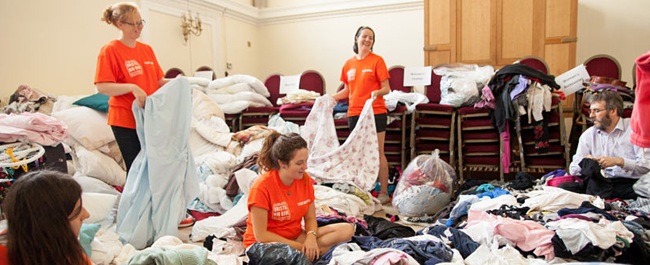Goal 12: Responsible consumption and production
Ensure sustainable consumption and production patterns
Our research
A pioneering study by Bristol academics, published in Nature in 2024, has shown that effective regulation and monitoring is vital to successfully tackling emissions of super-greenhouse gas trifluoromethane, as known as HFC-23. The gas is mainly produced as a byproduct in industrial production of refrigerants and Teflon, but the study revealed that factories are not properly destroying the gas so greater quantities are being produced than was reported, highlighting a need for greater regulation and independent auditing of such factories.
Sustainable timber use needs to move beyond local sourcing towards a more comprehensive, regenerative approach, according to research by Bristol researchers. The project in 2024 looked at increasing demand for timber and the position of domestic timber sources in the UK, seeking to understand how timber use fits into the wider economy and making recommendations for closer working between forestry and design elements to ensure timber consumption can transcend the circular economy of reuse and recycling to embrace regenerative design.
Our students
The University launched a new Centre in Doctoral Training (CDT) in late 2024 focused on sustainable composites engineering. This was a follow on from a previous CDT which centred around composites science, engineering and manufacturing and provided training and development for PhD students such as Stefania Akromah, whose work on mushroom-derived composites offers potential for sustainable building materials for developing nations in Africa. The new CDT will offer opportunities for students in areas including composite structures, photonics, composite aero-structures, and using AI for composite lifecycle assessment.
Bristol Big Give is our annual campaign to support students to donate reusable goods to the British Heart Foundation (BHF) at the end of the summer term. Organised by Bristol Student Community Partnership, students can leave clothes, books, and household and electrical goods at donation points on campus, in Halls, and across the city. In 2024, 2,784 bags were donated, equating to £42k for the BHF.

Our communities
The University was pleased to welcome Tim Young, Head of Sustainability at the UK National Composites Centre and Visiting Professor at the Bristol Composites Institute, who joined us in May 2024 for a public lecture on composite recycling. Professor Young was joined by Nancy Sottos of the Department of Material Science and Engineering at the University of Illinois Urbana-Champaign, who spoke about thermoset polymer and composite manufacturing. The session offered attendees an opportunity to hear cutting-edge thinking on sustainable materials and new technologies and approaches that can help make manufacturing more energy efficient and sustainable.
A new initiative to help farmers sell surplus produce directly to community organisations such as food banks, small producers and social supermarkets was launched by a Bristol academic in 2024. The Circular Agriculture Hub, co-designed with partners at the University of Nottingham, aims to help reduce food waste, increase access to fresh local produce, and create new networks and partnerships for farmers and community groups.
Ourselves
With more than 990 labs, making up 6% of our estate but responsible for 40% of our energy consumption, the University has been working to reduce their environmental impact, including by using the specialist Laboratory Efficiency Assessment Framework (LEAF) Programme. We were the first University to achieve 100% Green Lab Certification in 2021, and in 2024 Bristol Medical School became the second School in the University to achieve Gold certification in 100% of their labs, with a goal to reach 100% Silver certification or above for all University labs by the end of 2024.
In late 2024, Bristol Dental School began hosting a Terracycle box for dental care items. Staff, students and the public will now be able to drop off items including all brands of manual toothbrushes, electric toothbrush head and covers, dental floss containers, flossing sticks and interdental bushes, and electric flosser nozzles. The items will then be sent off for specialist recycling.
